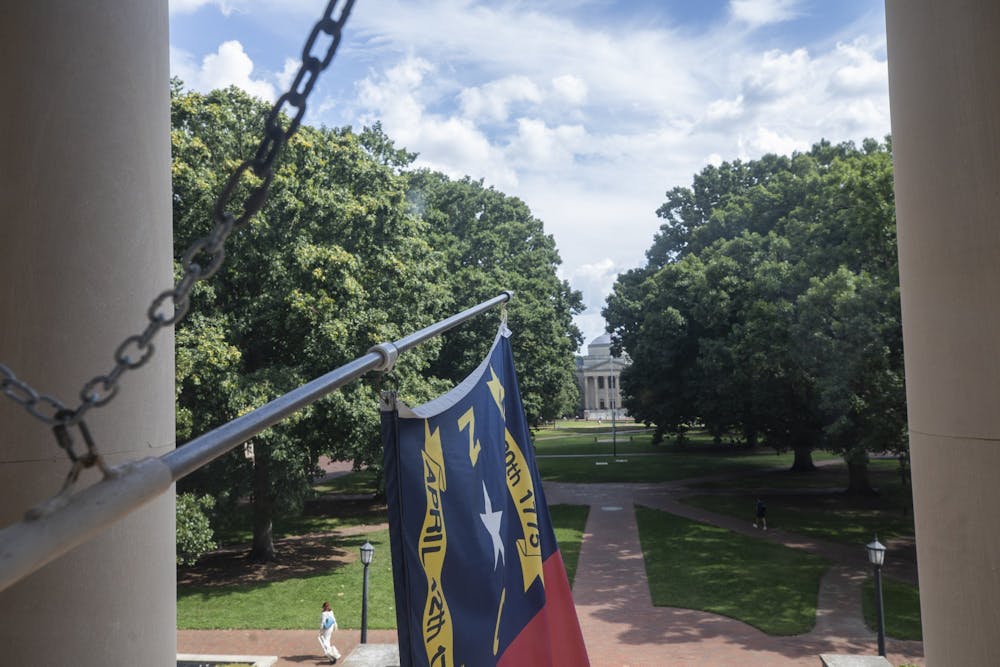As the University nears its spring break, the Faculty Executive Committee met on Monday to discuss classroom utilization, academic accreditation, impacts of Atlantic Coast Conference expansion, environmental material concerns and faculty involvement in the search for a permanent UNC chancellor.
Members also touched on the timeline of the Wilson Library renovations and closure delays while UNC Libraries works on a space master planning project.
Here’s the rundown.
What’s new?
-
Provost Christopher Clemens announced changes to classroom utilization, specifically adding class time to the standard course pattern.
- The changes would extend the Monday, Wednesday and Friday 3:35 p.m. class to 4:55 p.m. instead of 4:25 p.m. A class time will also be added to the standard course pattern from 5:05 p.m. to 6:20 p.m. on a two-day pairing on Monday, Wednesday or Friday. The additional class times were prompted because the University can only move forward with classroom renovations if the current ones are being maximized in use, Clemens said. He also said there would be more emphasis on making a class’s capacity 66 percent or more of the classroom capacity.
-
Hussman School of Journalism and Media professor Francesca Dillman Carpentier asked how current exceptions to the standard course pattern would be altered.
- “My question is, thinking about how this is going to be equitably rolled out in departments, what guidelines or at least what ways [are there] in which the people who will be making these decisions or communicating with one another about how instructors are getting which slots?” she said.
- She added that there are concerns about whether the new time slots will be distributed across faculty equitably.
-
Beth Moracco, chair of the faculty, raised questions about new legislation suggesting that UNC should switch accreditors every tenure cycle.
- Clemens said he sent a memo to the chief academic officer of the UNC System, which stated that UNC's faculty and staff are not equipped to undergo a new accreditation process at this time. The University is already set to undergo a reaffirmation process — the review process of institutions seeking continued accreditation — in December of this year.
- “The tenure swap is not a great way to recruit an accrediting agency for the long-term partnership; they're interested in a partnership, and we're not going to form them with these sporadic changes,” he said.
- Clemens declined to comment on other questions. He said that he needed more information to answer correctly.
-
Barbara Entwisle, professor of sociology, asked if there would be monitoring of how students are impacted by the ACC's expansion. Entwisle said she was concerned about how the absences of athletes would be disruptive toward non-athlete students.
- Clemens said no new measurements were currently in place to measure the impact on non-athletes.
- “There's almost no academic function with more attention on it than academic support for athletics,” Clemens said.
- Clemens said no new measurements were currently in place to measure the impact on non-athletes.
-
Catherine Brennan, executive director of environmental health and safety, said the recent concern regarding polychlorinated biphenyls (PCBs), chemical compounds which can be found in building materials, is that they are most harmful to those doing demolition, including UNC maintenance and construction staff.
- Brennan said the Environmental Health and Safety Department will observe all demolitions and renovations around campus to protect against potential hazards. The EHS department is responsible for identifying potentially suspicious or hazardous materials.
- “As part of the management program, if we do have PCBs, we're going to contain them, monitor during the actual removal, so there is no occupational exposure to the person doing the disturbance, and then a big part of it is proper disposal of the materials after they've been taken out," Brennan said.
-
Meg Zomorodi, professor of nursing, asked what the role of Anita Brown-Graham, the associate dean for strategic initiatives at the UNC School of Government, is in the search process for a permanent chancellor.
- Moracco said that she thinks Brown-Graham will serve as a valuable liaison between the search advisory committee and the various UNC-affiliated constituencies she is a part of. She added that the search advisory committee is fairly constrained, and that Brown-Graham will represent a multitude of voices in the process.
-
Sue Estroff, professor of social medicine, said she was concerned about UNC System President Peter Hans possibly stepping around the committee process and inserting unvetted candidates into the final search.
- Moracco said they've been assured the search will be an authentic process.
- “My role on the search committee is to get as much information and feedback and bring these concerns to the committee and bring the feedback —I wish there were more of me — these are absolute types of things that I want to hear," she said.




